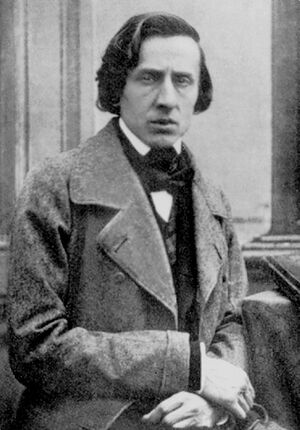Frederick Chopin


Frederick Chopin was born in 1809 of French-Polish origin.
The sign of Pisces
Chopin was a true son of Pisces. His good friend Franz Liszt wrote of him what can be said to be the characteristics of a true Piscean:
He kept apart from all noisy and frequented ways and built a secluded cell for himself. As the devout pour out their souls in prayer, so he poured out his soul into his compositions. What others say on their knees, he uttered in tone-language—all the mysteries of passion and grief which man can understand without words, because there are no words in which they can adequately be expressed.
There comes a time when we leave off words and the expressions of the soul can only be given through music.
Chopin is true to the water nature of the ruler of his sign. He wished all of his compositions to be played with a rocking, undulatory motion, simulating the rippling movement of water. Liszt wrote:
By his peculiar style of playing, Chopin imparted with most fascinating effect a constant rocking, making the melody to undulate to and fro like a skiff driven over the bosom of tossing waves. This manner of execution, which set so peculiar a seal upon his own style of performance, was first indicated by the words Tempo rubato affixed to his works; a tempo broken, agitated, interrupted.[1]
The music of Chopin flows to the movement of water, and also to the color, an azure blue, which, it has been said, is the spirit’s compensation for sorrow. When we think of Pisces we must always remember that it marks the total sacrifice, the total surrender in the Garden of Gethsemane. And so the true Piscean knows the way of Gethsemane, the way of the fourteen stations of the cross. And so Pisces has been called the sign of sorrow. But it is not sorrow that endures, only for a night and joy cometh in the morning.
Through personal love man experiences Gethsemane. Through impersonal love, he triumphs in the flame of God mastery. Jesus’ love for his disciples, for us, for all mankind made him go through this pain. The pain is a transmutation of world sin, of weltschmertz. The world pain that we feel is the alchemy, the process of transmutation whereby the energies that were locked in pain and sorrow are transmuted. And in the strength of our joy is born the fire of resurrection. The strength becomes the impetus for resurrection. And so by understanding alchemy we see how pain brings out the highest in man.
Chopin and the spirit of Poland
The expression of the very soul of the people of Poland came through the works of Frederick Chopin. We must understand that every nation has an aspect of the Christ consciousness that it is intended to bring forth, to hold up as a star, as a gem an aspect of God’s consciousness which must appear. How boring it would be if all nations and peoples were alike. We would all know each other, we would all be the same. But we come to know the Christ through the incarnation of the Christ in many people. Through the Polish people, the great love of freedom is paramount.
Some people hear in the music of Chopin what they call the indefinable sadness of his music, where laughter is disguising a heart of tears. But I hear the triumph of the flame of mastery[2] over sorrow. And all the sorrows and the burdens, the revolutions, the persecutions of the Polish people are made into a triumph in the waters and the fires of freedom. It is this genius that Chopin captured through meditation upon the angel deva of Poland, the Christ consciousness, the causal bodies of all of her people.
There are ten or more polonaise which he wrote, inspired by the great patriotic poets of his day. They are a music that expands our sense of freedom in the finite, that is a bridge to our sense of freedom in the infinite. George Sand said of Chopin, “He was a lover of an Impossible so shadowy and so near the stellar regions.”[3]
As this music was taken from the genius of the Christ consciousness, so it gives back to a people who become burdened by the human consciousness their lost identity, their very soul. And so the music of Chopin has been the very soul of Poland, which has given them the dignity and the worth to stand before any foe, any army, and to say, “You shall not trample upon the fires of freedom.”
It is a legacy to the world from which we all can learn, and to which we can all aspire to attain. Every culture, every nation has that peak of the realization of an aspect of the Christ consciousness. Nowhere is it more beautifully captured than in the music of the people.
Sources
Elizabeth Clare Prophet, September 30, 1973.
- ↑ Franz Liszt, Life of Chopin, quoted in Henry T. Finck, Success in Music and How It Is Won (New York: Charles Scribner’s, 1909), p. 270.
- ↑ Pisces is the two o’clock line of the cosmic clock, the quality of God mastery.
- ↑ Hal A. Lingerman, The Healing Energies of Music (Wheaton, Ill.: Quest Books, 1995), p. 163.
